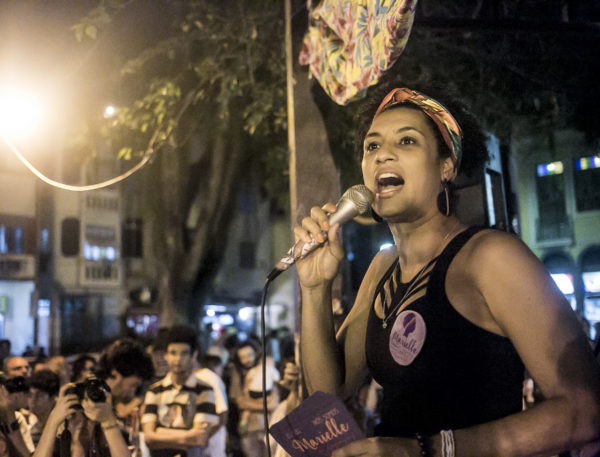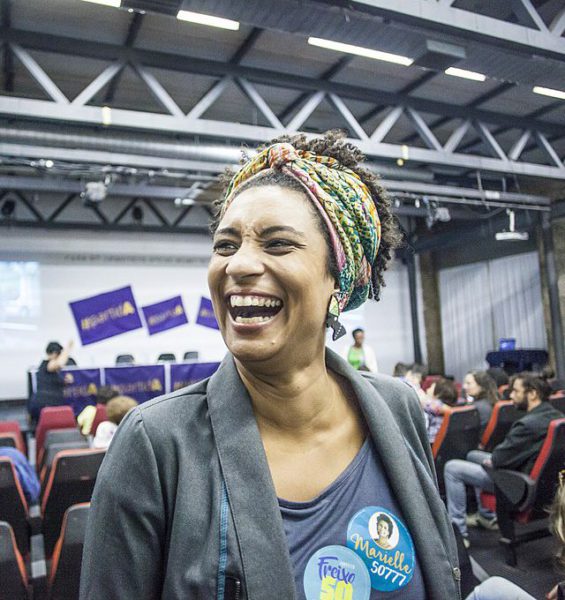Our findings reveal a grim picture: women in Rio de Janeiro and Brazilian women in London had suffered various types and forms of violence over their lifetime, mostly by men known to them, including intimate partners, bosses, work colleagues, and family, in episodes that took place not only or mainly in the private sphere of the home but also in a variety of public spaces. In other words, our findings show that VAWG in Rio and among Brazilians in London is diffuse and diverse and part of a global pandemic, that has or will affect 1 in 3 women in their lifetime.
The seminar over, the team sat down to dinner in celebratory mood, exchanging opinions about the research and the event just held, and discussing ideas for further collaborative work. But last night also marked a tragic loss. Just as we finished dinner and went home, the life of Marielle Franco was being cut short in downtown Rio de Janeiro.
Marielle was born and brought up in Maré, the very favela complex where we carried out research in Rio de Janeiro, which is well known by members of the Rio research team, and indeed, Marielle was close to one of them. A Black woman, mother and long-standing activist of human and social rights, she went on to study for a degree and a Master’s, and worked to expose the oppression of favela residents, women and Afro-descendants, and particularly the violence perpetrated by the police during raids into the Rio favelas. She was elected a councillor in Rio de Janeiro in 2016 for a leftist party, receiving the fifth highest number of votes. She had put forward various pieces of legislation focused on improving safety and security in the favelas and exposing and fighting local government corruption. Following the recent deployment of the Army on the streets of the whole state of Rio Janeiro by the national government, with the stated aim of ‘enforcing law and order’, Marielle voiced her strong criticism of the heavy handed, random and unaccountable actions by the military in their recent intervention in Acari favela. The last tweet she posted was precisely to denounce the military police: ‘Another homicide of a young man that could be credited to the police. Matheus Melo was leaving church when he was killed. How many others will have to die for this war to end?’

Last night, as Marielle left a meeting with Black women in central Rio, she was the target of a drive-by shooting that killed her and leaves little doubt that it was retaliation for her outspoken views about violence by the police. Another amazing woman who dedicated her life to improve that of million others was brutally slain, another victim of femicide in Brazil, whose rate of 4.8 female homicides per 100,000 people was 48 times higher than that in the United States, and highest of 30 countries measured in 2013.
How many more Marielles will have to die?
I am deeply shocked, saddened and angry, as are many people in Brazil and elsewhere. Thinking about our project and how it might modestly help improve the lives of VAWG survivors, I cannot but feel overwhelmed by learning that another woman in Brazil lost her life, and one who was so pivotal to helping save the lives of women, children and men in Maré and other areas in Rio. But, let’s honour Marielle’s life and work. Her killing means to silence her but we must not let that happen: her voice must carry on being heard to denounce and bring to justice the perpetrators of violence and inspire more and more to mobilise and fight VAWG. RIP Marielle!
Yara Evans is a Research Associate at the ESRC-funded project, Healthy, Secure and Gender-Just Cities: Transitional Perspectives on Violence Against Women and Girls in Rio de Janeiro and London. This blog is reposted from the project website.
